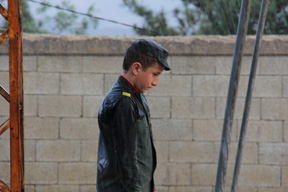A Memory in Khaki
 QATAR / 2016 / Arabic / Color / DCP / 108 min
QATAR / 2016 / Arabic / Color / DCP / 108 min
Director, Editing: Alfoz Tanjour
Script: Alfoz Tanjour, Louai Haffar
Photography: Ahmad Dakroub
Composer: Kinan Azmeh
Dramaturge: Ali al-Kurdi
Art Advisors: Arash T. Riahi, Linda Zahra
Executive Producer: Louai Haffar
Production Manager: Eyad Shihab
Source: Louai Haffar
“If it weren’t for this place, I wouldn’t be me.” The artist Ibrahim Samuel, whom director Alfoz Tanjour respects and admires, once spoke of his love for Damascus in this way. Years later, he left the Damascus that he loved. Ibrahim and three others appear in this film and speak about their complicated thoughts on their homeland. For one character, home is a repressive world symbolized by the color khaki; for another it is a violent world drenched in red. In this film the director depicts the incomparable emotions involved in losing the place where one was raised. This expression of bitter sadness marks the heart of the viewer, and will not be easily alleviated.
[Director’s Statement] I love images, stories, and dreams—this intellectual and imaginative combination initially stemming from the long process of observing reality.
Cinema narrates its own world, using images. Its pictorial expression is like the expressing of dreams; as Fellini said, “Dreams are the only reality.”
I was born in the seventies. My father was a communist, which was normal at that time in the city of Salamiyah, which had a history of poetry, dry desert air, and left-wing Marxism. I never attended the Baath Party sessions, nor those of any other party. I simply used to escape—sometimes to the small cinema in my town, and more often into the stories of Chekhov and Tolstoy. I was influenced by Zorba and Marquez. I loved Baudelaire and Hermann Hesse. To me, reading was a beautiful world that I used to escape to. I didn’t know back then that this would be my motivation to study cinema, and my desire to seek out the truth.
The most remarkable thing that happened to me during making this film was when I sought asylum in Austria. It was difficult for me to believe that I was outside my homeland and Syrians kept being killed in Syria every day! It was a very hard experience on the psychological and humanitarian level, which encouraged me to combat weakness by making this movie.
I wanted to face exile, fear, and maybe nostalgia with my work, through cinema. I wanted this film to be a cry out, for that which is embattled inside the spirits of individuals who lived under the oppressive Syrian regime. I wanted as well to shed a light on years of silence, terror, dark prisons, and to dive into the roots of what happened and is still happening in Syria: the events which were behind the eruption of Syria’s society and the start of its revolution.
The film presents stories of different people, the way they deal with a reality imposed upon them as a predetermined fate, their battles with day-to-day life, their minor imaginary victories and their many defeats, disappointments and anguish.
This film is a Syrian narrative, which by laying out the past, tells the story of the future.
 Alfoz Tanjour
Alfoz TanjourAlfoz Tanjour is a Syrian director, born in 1975. Since his 2004 graduation from the course in Film Directing at the Academy of Fine Arts in Moldova, he has directed many short films, among them The End of a Red Balloon and A Little Sun, winner of the Bronze Tanit award at the 2008 Carthage Film Festival and the Special Jury Prize at the 2009 Mons Festival in Belgium. He has also directed numerous documentaries, among them Damascus . . . Symphony of a City; Black Stone; Cola Bridge; Outside the City’s Walls; Faraway, So Close to the Homeland; and Wooden Rifle; which won the Public Liberties and Human Rights award at the 2013 Aljazeera International Documentary Film Festival and the Gold Panda for best production at the 2014 International Gold Panda Awards for Documentary, in China. Alfoz is currently preparing to shoot his first feature-length narrative film.
